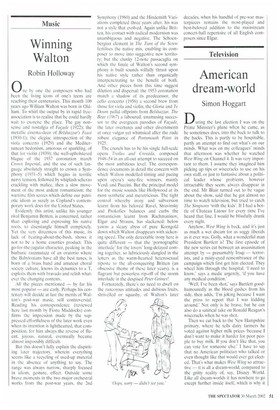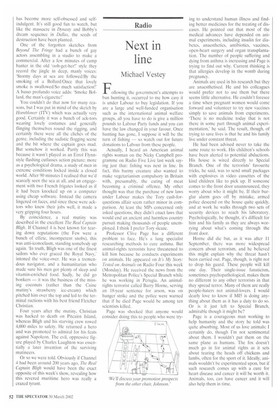American dream-world
Simon Hoggart
During the last election I was on the Prime Minister's plane when he came, as he sometimes does, into the back to talk to the hacks. This is partly to be hospitable, partly an attempt to find out what's on our minds. What was on my colleagues' minds that afternoon was whether he watched West Wing on Channel 4. It was very important to them. I assume they imagined him picking up tips or wisecracks to use on his own staff, or just to fantasise about a political leader whose problems, however intractable they seem, always disappear in the end. Mr Blair turned out to be vague about the show, said that he got almost no time to watch television, but tried to catch The Simpsons 'with the kids'. If I had a bottle of Chateau Latour for every time I've heard that line, I would be blissfully drunk every night.
Anyhow, West Wing is back, and it's just as much a wet dream for us soggy liberals as it ever was. Golly, what a wonderful man President Bartlett is! The first episode of the new series cut between an assassination attempt by — presumably Iraqi — terrorists, and a misty-eyed remembrance of the campaign which first got him elected. They wheel him through the hospital, 'I need to know,' says a medic urgently, `if you have any medical condition.'
'Well, I've been shot,' says Bartlett goodhumouredly as the blood gushes from his side, then adds, 'I'm joking because I want the press to report that I was kidding around.' Not only is he brave, but he can also do a satirical take on Ronald Reagan's wisecracks when he was shot.
Then we cut back to the New Hampshire primary, where he tells dairy farmers he voted against higher milk prices 'because I don't want to make it harder for poor people to buy milk. If you don't like that, you can vote for someone else.' I have to say that no American politician who talked or even thought like that would ever get elected. That's what makes West Wing so attractive — it is all a dream-world, compared to the gritty reality of, say. Disney World. Like all dream-worlds it has nowhere to go except further inside itself, which is why it has become more self-obsessed and selfindulgent. It's still good fun to watch, but like the massacre in Dynasty and Bobby's dream sequence in Dallas, the seeds of destruction have been planted.
One of the forgotten sketches from Beyond The Fringe had a bunch of gay actors assembling in a studio to make a commercial. After a few minutes of camp banter in the old a'ooh-get-her!' style they record the jingle in deep, manly voices: 'Stormy days at sea are followed/By the smoking of a Bollard/Once that lovely smoke is swallowed/So much satisfaction!' A basso profundo voice adds: 'Smoke Bollard, the man's cigarette!'
You couldn't do that now for many reasons, but I was put in mind of the sketch by Homblower (ITV) which was actually very good. Certainly it was a bunch of ack-tors wearing lovely costumes and generally flinging themselves round the rigging, and certainly there were all the cliches of the genre, including the sadistic flogging scene and the bit where the captain goes mad. But somehow it worked. Partly this was because it wasn't played as an Errol Flynnstyle flashing cutlasses action picture; more as a psychological drama, a study of men in extreme conditions locked inside a closed world. After 90 minutes I realised that we'd scarcely seen the sea at all, and an engagement with two French frigates looked as if it had been knocked up on a computer using cheap software. Instead the camera lingered on faces, and since these were acktors who knew their jobs well, it made a very gripping four hours.
By coincidence, a real mutiny was described in the excellent The Real Captain Bligh. If Channel 4 is best known for tearing down reputations (the Few were a bunch of effete, incompetent snobs), this was anti-iconoclasm, standing somebody up again. 'In truth, Bligh was one of the finest sailors who ever graced the Royal Navy,' intoned the voice-over. He was a tremendous navigator, and a humanitarian who made sure his men got plenty of sleep and vitamin-enriched food. Sadly, he did go honkers — it was the business of the missing coconuts (rather than the Caine mutiny's strawberry ice-cream) which pitched him over the top and led to the terminal ructions with his best friend Fletcher Christian.
Four years after the mutiny. Christian was hacked to death on Pitcairn Island, whereas Bligh and his starving crew rowed 4,000 miles to safety. He returned a hero and was promoted to admiral for his feats against Napoleon. The evil, oppressive figure played by Charles Laughton was essentially a later invention of the surviving mutineers.
Or so we were told. Obviously if Channel 4 had been around 200 years ago, The Real Captain Bligh would have been the exact opposite of this week's show, revealing how this revered maritime hero was really a crazed tyrant.



































































 Previous page
Previous page